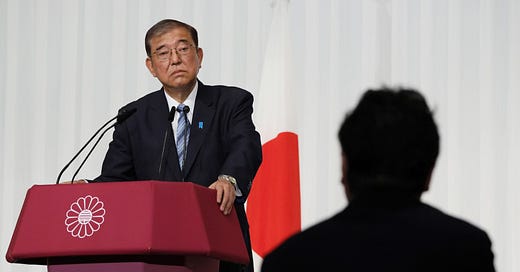Japan enters new era of unexpected political instability
Shigeru Ishiba, the man elected earlier this month to revive the ruling party's flagging popularity, has stunningly failed in his mission.
After years of relative stability, Japan has been plunged into political uncertainty after Sunday’s election delivered a shock trouncing to the party that has governed the country almost uninterrupted since 1955.
Shigeru Ishiba, the man elected earlier this month to head the ruling Liberal Democratic party in the hope that he could revive its flagging popularity, has stunningly failed in his mission.
The centre-right LDP has lost its parliamentary majority for the first time in 15 years, with Ishiba at risk of becoming the shortest-serving prime minister in Japan's post-war history.
Ahead of the elections, the LDP and its long-term junior coalition partner Komeito had a stable majority of 279 seats while the LDP alone had 247. Now, the LDP retains just 191 seats.
The 67-year-old Ishiba replaced Fumio Kishida after he resigned as LDP leader and PM in the wake of the party’s political fundraising row.
But Ishiba has failed to draw a line under the so-called “slush fund scandal”.
For large swathes of the Japanese population, this election was less a vote “for” anyone in particular, than it was a vote “against” the incumbents. Sound familiar?
In another echo, after initially hinting that he was in no rush to call an election, Ishiba backtracked and took many off guard.
Though perhaps this short-sighted hastiness is a closer parallel with a certain leader across the Channel than it is with the UK’s own former PM: Ishiba made the gamble of calling a snap election in the hope that it would bolster his position, only for it to spectacularly backfire.
What now?
The clock is ticking on a 30-day deadline to form a government.
Ishiba argued today that he should remain in office to avoid a "political vacuum". While he faces pressure to resign, he may succeed in clinging onto power since there is no obvious replacement. Japan’s opposition comprises eight different parties, none of which are anywhere close to reaching a majority.
A rainbow coalition government likely beckons, alongside a possible return to short-term prime ministers. When the LDP last lost power in 2009, Japan had three prime ministers from opposition parties in three years.
Prior to the unexpected result, foreign interest in Japan’s election had been minimal. And the markets were not preparing for a possible upset.
But there is every reason now to pay attention to this new period of political uncertainty in the world’s fourth largest economy.
Japan is in the middle of a rearmament programme to counter the threat of China and that rested, to some extent, on political stability.
Decisions made by Japan’s central bankers have global ramifications. Indeed, the global market panic at the start of August was largely sparked by the Bank of Japan’s decision to unwind what is known as the yen carry trade.
After the BOJ finally started raising interest rates in late July, the value of the yen strengthened against the dollar.
Today, it has taken a tumble, weakening 0.64% to 153.28. So it has given up all its post-rate-hike gains, and is as weak as it was in early summer.
Financial analysts are now predicting that Japan’s heightened political confusion could deter the country’s central bankers from hiking rates again. Meaning the Yen will stay weak. Which probably explains too why Japanese stock markets went up this morning.
Caitlin Allen
Deputy Editor
ON REACTION TODAY
Iain Martin
What the slavery reparations racket is really about
Ian Stewart
Batteries: charging the energy transition
Neil Collins
The tech behemoths have recognised our need for nuclear power
ALSO KNOW
Georgian election fallout - Tens of thousands of Georgians have gathered in the streets of the capital, Tbilisi, in response to a call from the pro-Western president Salome Zourabichivili, to rally outside parliament. Zourabichivili, who has sided with the opposition, has appealed to the international community to stand behind her country's population after a disputed election that she says was "totally falsified". The ruling Georgian Dream party and the election commission insist the result, giving the government almost 54% of the vote, was free and fair.
UN issues warning over northern Gaza - Joyce Msuya, the acting Under-Secretary-General for Humanitarian Affairs, has issued a statement warning that the "entire population in North Gaza is at risk of dying". The OCHA says that people in North Gaza are in desperate need of life-saving care and that Israeli authorities denied additional requests over the weekend to bring in food and fuel for water facilities in Jabalya.
Tommy Robinson jailed - Far-right activist Tommy Robinson has been jailed for 18 months after admitting contempt of court by repeating false claims against a Syrian refugee. Robinson, whose real name is Stephen Yaxley-Lennon, admitted 10 breaches of a High Court order made in 2021, during a hearing at Woolwich Crown Court.
Bus fares to rise - The single bus fare cap in England will be raised to £3 in the upcoming Budget, Prime Minister Sir Keir Starmer has announced. It is an increase on the current limit of £2 which was introduced under the previous Conservative government to help with the cost of living. The existing cap was due to expire at the end of December.
FIVE THINGS
Curated by the Reaction Team - Emily Gray
1. In Georgia, Barack Obama spoke of character, and in Michigan, Michelle Obama reminded voters of the stakes for women’s lives, writes the New Yorker.
2. The Conversation on what international law says about the targeting of peace keepers.
3. A government memo viewed by WIRED states that insider threats “could derail or jeopardize a fair and transparent election process”
4. Earth is now gaining less heat than it has for several years, reports New Scientist.
5. How the mob went mainstream, in Unherd.








